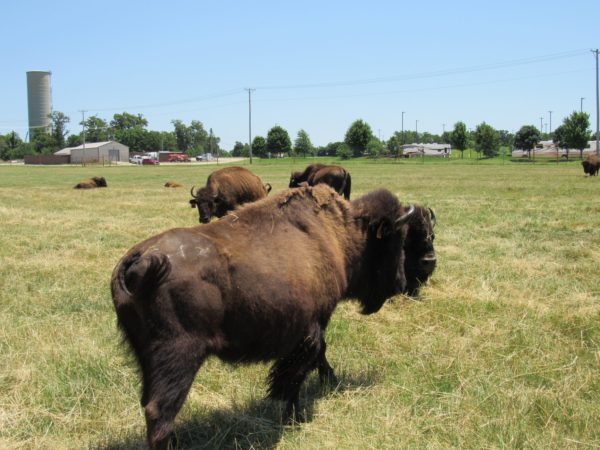
- Details
- By Native News Online Staff
10-year initiative provides framework for shared conservation goals
WASHINGTON — The U.S. Department of the Interior announced on Thursday a new cooperative initiative called the Bison Conservation Initiative that will coordinate conservation strategies and approaches for the wild American bison over the next 10 years.
American Indian tribes are among the partners that include states and non-governmental organizations in the initiative. The goal is to restore the populations of the American bison and support healthy herds.
“Interior is uniquely positioned to lead the way for shared stewardship of this iconic American species,” said Interior Secretary David Bernhardt. “This 10-year plan will guide our collaboration with states, tribes, private conservationists and managers across public lands to advance conservation efforts and honor iconic wild bison.”
Bison were hunted to near extinction in the late 19th century. Today, there are about 11,000 plains bison in 19 herds on 4.6 million acres of public land across 12 states because of successful public-private conservation partnerships. In 2016, Congress recognized the importance of the American Bison to the country’s history, celebrating it as our national mammal.
“We are doing something that has never been done. It shows what is possible when business, philanthropy, and government work together to create multiple bottom line initiatives supporting the environment, people, fiscal responsibility, and Native nation building,” said Rosebud Economic Development Corporation’s CEO, Wizipan Little Elk.
The DOI Bison Working Group (BWG)--comprised of representatives from the National Park Service (NPS), U.S. Fish and Wildlife Service (FWS), Bureau of Land Management, U.S. Geological Survey and the Bureau of Indian Affairs--has worked with its partners to strengthen resource coordination, institute a conservation genetics framework and publish investigations into metapopulation management and herd health.
The BWG will now:
- Develop and launch a DOI bison metapopulation strategy
- Develop and implement a DOI bison stewardship plan
- Improve and expand mechanisms to support ecocultural restoration of live bison
- Adopt low stress capture and handling practices
These actions will be organized around five central goals:
- Wild, Healthy Bison Herds: A commitment to conserve bison as healthy wildlife.
- Genetic Conservation: A commitment to an interagency, science-based approach to support genetic diversity across DOI bison conservation herds.
- Shared Stewardship: A commitment to shared stewardship of wild bison in cooperation with states, tribes and other stakeholders.
- Ecological Restoration: A commitment to establish and maintain large, wide-ranging bison herds on appropriate large landscapes where their role as ecosystem engineers shape healthy and diverse ecological communities.
- Cultural Restoration: A commitment to restore cultural connections to honor and promote the unique status of bison as an American icon for all people.
The 2020 Bison Conservation Initiative page provides additional information about how the DOI is working to improve the conservation and management of bison.
More Stories Like This
Native News Weekly (August 25, 2024): D.C. BriefsNavajo Nation Mourns the Passing of Former Vice President Rex Lee Jim
Deb Haaland Earns Endorsement From Communications Workers of America Local 7076
University Soccer Standout Leads by Example
Two Native Americans Named to Democratic Congressional Campaign Committee's“Red to Blue” Program
Help us defend tribal sovereignty.
At Native News Online, our mission is rooted in telling the stories that strengthen sovereignty and uplift Indigenous voices — not just at year’s end, but every single day.
Because of your generosity last year, we were able to keep our reporters on the ground in tribal communities, at national gatherings and in the halls of Congress — covering the issues that matter most to Indian Country: sovereignty, culture, education, health and economic opportunity.
That support sustained us through a tough year in 2025. Now, as we look to the year ahead, we need your help right now to ensure warrior journalism remains strong — reporting that defends tribal sovereignty, amplifies Native truth, and holds power accountable.
 The stakes couldn't be higher. Your support keeps Native voices heard, Native stories told and Native sovereignty defended.
The stakes couldn't be higher. Your support keeps Native voices heard, Native stories told and Native sovereignty defended.
Stand with Warrior Journalism today.
Levi Rickert (Potawatomi), Editor & Publisher

